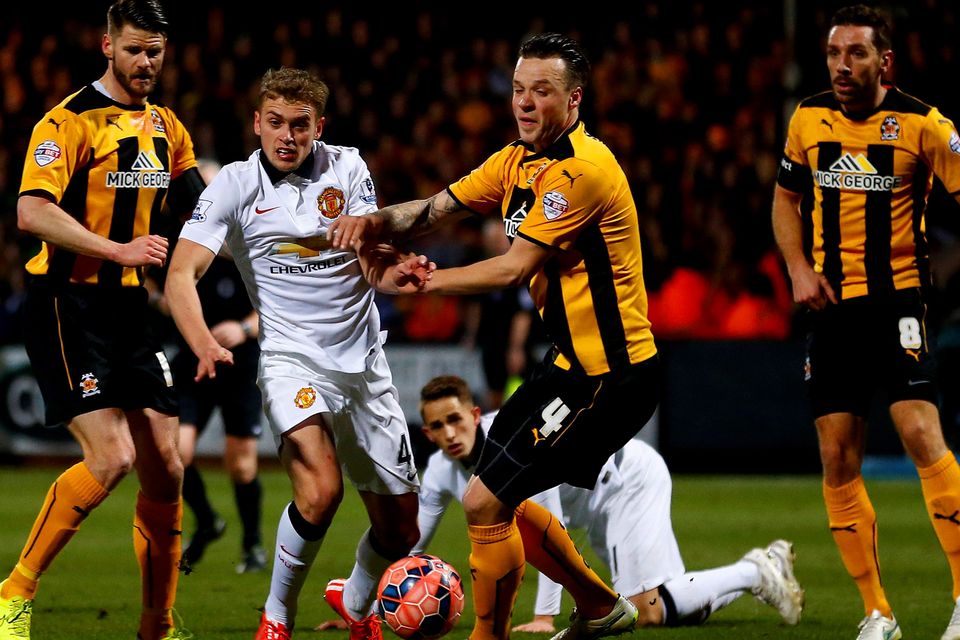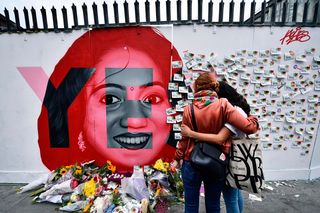How to use FA Cup cash, and how not to
James Wilson of Manchester United battles for the ball with Josh Coulson of Cambridge United during the FA Cup Fourth Round match between Cambridge United and Manchester United
Tea shacks and toilets are definitely not headline-making purchases but Cambridge's approach to their new-found riches appears a sensible one.
They will receive 45 per cent of the gate receipts from their FA Cup replay at Manchester United this week and with the game being televised the club can expect a windfall of over £1.5million.
But despite the desire of some supporters for the money to be spent on players, chairman Dave Doggett is making upgrades to the Abbey Stadium a priority.
It is a stick-or-twist dilemma which has faced several other clubs, and there are many examples of how to spend FA Cup windfalls wisely, and how to squander them.
Here, Press Association Sport's Wayne Gardiner looks at those who made the most of their payday, as well as getting an expert opinion on what is best for Cambridge and any other club lucky enough to face a Premier League team.
How not to do it: Scarborough
Mark Quayle, signed from Nuneaton for £2,000, scored the only goal as Scarborough beat Southend for the right to host Chelsea, in their first season under Roman Abramovich, at the McCain Stadium in the FA Cup fourth round in 2004.
Chairman Malcolm Reynolds, presiding over losses of £250,000 a year, said at the time that he expected to earn close to £500,000 from the televised tie, money he said would "change the entire history of the club" and "very nearly pay the wage bill for the next two years".
A John Terry goal gave Chelsea a 1-0 win, but the Conference side were the big winners. 'Roy of the Rovers' stories emerged from the dressing room, most notably man-of-the-match goalkeeper Leigh Walker, whose signed Carlo Cudicini shirt was irreparably washed by his mum.
Reynolds chose to invest in the team, all the while talking of a move to a fortune-changing new stadium. The now-Leeds manager Neil Redfearn was signed and scored 15 goals as the club went a whole season unbeaten at home.
"The club could have cut costs immediately and put a squad together for peanuts," said Martin Dowey, the club's long-suffering correspondent from the Scarborough News.
"But that might still not have made a difference as the club was liquidated owing over £2.2million. The club had some good times after the Chelsea game, in particular beating York 5-1. That wouldn't have happened if the money had been slashed immediately."
The boom soon turned to bust, though, and when Nick Henry was sacked as manager Redfearn was promoted but unable to prevent a slide to the Conference North.
"The FA Cup money was a stop-gap that gave the club a short reprieve," Dowey added.
Financial troubles meant they started the next season with a 10-point deduction and they were relegated again. Reynolds had been disqualified as a director and in the summer of 2007, the 128-year-old club was liquidated. Their history had not so much changed but ended.
"I spent much of my working week at the club and you could see the stress caused by trying to meet every financial deadline," Dowey said.
The Chelsea money ran out and, although supporters set up Scarborough Athletic in 2007, that club plays in Bridlington. The McCain Stadium, left untended and torched, was bulldozed last year. Scarborough missed their window.
Those who did it right: Exeter
When Tony Cascarino conducted the third-round draw for the 2004-05 season, he helped change the fortunes of an entire club by picking out ball number 64. Cascarino's choice sent Exeter, then of the Conference and with a seven-figure debt, to Manchester United.
City staggeringly drew 0-0 at Old Trafford, against a side featuring the likes of Cristiano Ronaldo and Wayne Rooney. As such they were quickly planning for a home replay which, although they lost 2-0, ensured their debts became a thing of the past.
"At that point we had £1million of debt to pay off. People have said that the Manchester United game saved us; I dispute that as I think we would have paid it off but it would have taken us a long time," Julian Tagg, Exeter's vice-chairman, told Press Association Sport.
"We went from being a club who owed a lot of money to being a club with no money. But make no mistake, we had no white knight and that money was a godsend."
Exeter were relegated from the Football League in 2003, financially crippled in the wake of a bizarre period which saw Uri Geller join their board and appoint Michael Jackson as an honorary director.
After the circus left town a Supporters' Trust took over and quickly found money hard to come by.
"We had entered a CVA (Creditors Voluntary Agreement) a year before and we had a lot of things that were left unpaid. That game cleared the debt that was hanging over our head," Tagg added.
Cambridge's players will enjoy a day out at Old Trafford but Tagg admits planning such an excursion for a small club can be a logistical nightmare for the staff.
"It stretched our every sinew," he said.
"We quickly had to get organised to go there and we were a club surviving largely with volunteers - we even had players who had not been paid!
"We were on our knees at the time but were fuelled by the excitement. We were in at 8am on the Sunday in a real spin as no one had expected we would be bringing Man United back!"
Back in the black, Exeter returned to the Football League in 2008 and remain there now, having also spent three seasons in League One.
"It would be very easy to get it wrong," Tagg said.
"We had a massive windfall but you have to do your best to behave as you did previously. Unless you put the money back into the club you will use it up quickly. It's the gamble everyone has the chance to make. If you make it, fantastic, if you don't, then it's a dangerous place."
The expert's view: Rob Wilson, specialist in football finance at Sheffield Hallam University.
Smaller clubs, be they league or non-league, are catapulted into the spotlight when Premier League clubs come calling, with tales of day jobs and struggle commonplace.
The spotlight is fleeting, though, and quickly moves on, but according to Wilson, the legacy of brief fame can still be costly.
"What you've not got to do is throw the kitchen sink at it and get lured in," he told Press Association Sport.
"Agents are notorious for driving hard bargains, and if a club has money in the bank an agent will know that and prices will go up.
"At this level they are not huge amounts of money, but the playing squad will also know there is more money when they come to renegotiate their deals.
"Also, when you factor in bonuses, wages and the celebrations, the money erodes quite quickly."
The nature of the FA Cup means a club can be thrust from 3,000 crowds to a 75,000 one in the blink of an eye, giving owners used to penny-pinching a raft of cash they are likely to have never seen before.
In the haze of such unexpected fortune a club could be forgiven for spending unwisely but, according to Wilson, plans should always be in place in case of such an eventuality.
"You should never budget for cup runs but you should have a 'what if' scenario in case this happens so you know what to expect, what you might do," he said.
"The clubs we are talking about don't generate these sorts of figures in a year, so it burns a hole in their pockets. If you take out bonuses and directors take a little bit extra, it's easily spent.
"Any good model is one of consolidated growth, incrementally building nice and slow, investing in your academy, your squad and your coaches. You need to build an infrastructure for the future.
"You need to stash a bit aside for that rainy day when the roof starts leaking. You are then able to fix it and don't have to send the buckets round!"















